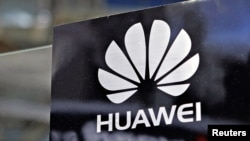BEIJING — China has rejected a U.S. Congressional report accusing two major Chinese telecommunications companies of posing a security threat to the United States.
The draft report from U.S. lawmakers said American companies should avoid doing business with China’s largest phone equipment companies, Huawei and ZTE, out of concern government influence over the companies could pose a security risk to the United States.
Foreign Ministry spokesman Hong Lei rejected that claim, saying Chinese companies are not a security threat to the United States, as the report alleged.
He said China’s telecom companies have developed their international business based on market economy principles. He said their investment in the United States embodies the mutually beneficial nature of Sino-American economic and trade relations. He said China hopes the U.S. Congress will set aside prejudices and respect facts.
The Congressional report
The Congressional report’s findings came after a nearly year long probe into the companies. The draft report cited industry experts and former Huawei employees alleging immigration violations by the company, bribery, corruption and industrial espionage.
Huawei executives deny the allegations. They say the company has a very good track record in network security and would not engage in the illegal behavior described in the committee’s report.
House lawmakers also warned that technology in Chinese-manufactured phone components could allow Beijing authorities to intercept high level communications, gather intelligence and shut down network systems during national emergencies.
During hearings into the issue last month, Jan Schakowsky, a member of the House Intelligence Committee, said the investigation raised many questions that remain unanswered, despite testimonies from senior executives of both ZTE and Huawei
“I know that the Intelligence Committee asked for a number of pieces of information, that it’s been hard to get or it hasn’t gotten, so it’s been difficult to confirm or discredit some of the questions that have been raised,” said Schakowsky.
The report said Huawei and ZTE did not provide documentation and detailed information on their corporate structure, financial arrangements and relationships with the Chinese government.
The committee said the United States should block mergers and acquisitions with Huawei and ZTE and that the U.S. government should ban the use of any components made by the two firms in its computer systems.
China's telecom giants
Huawei has rapidly grown to become the world’s second largest telecommunication equipment manufacturer, with operations in 140 countries. ZTE is the world’s fourth largest mobile phone maker.
Huawei employs 1,700 people in the United States. Revenues there rose to $1.3 billion in 2011. But the Congressional report may limit both companies’ expansion in the domestic market.
The report’s findings will likely also become an issue in the final weeks of the U.S. presidential campaign in which both candidates have said they will stop Chinese trade violations.
The draft report from U.S. lawmakers said American companies should avoid doing business with China’s largest phone equipment companies, Huawei and ZTE, out of concern government influence over the companies could pose a security risk to the United States.
Foreign Ministry spokesman Hong Lei rejected that claim, saying Chinese companies are not a security threat to the United States, as the report alleged.
He said China’s telecom companies have developed their international business based on market economy principles. He said their investment in the United States embodies the mutually beneficial nature of Sino-American economic and trade relations. He said China hopes the U.S. Congress will set aside prejudices and respect facts.
The Congressional report
The Congressional report’s findings came after a nearly year long probe into the companies. The draft report cited industry experts and former Huawei employees alleging immigration violations by the company, bribery, corruption and industrial espionage.
Huawei executives deny the allegations. They say the company has a very good track record in network security and would not engage in the illegal behavior described in the committee’s report.
House lawmakers also warned that technology in Chinese-manufactured phone components could allow Beijing authorities to intercept high level communications, gather intelligence and shut down network systems during national emergencies.
During hearings into the issue last month, Jan Schakowsky, a member of the House Intelligence Committee, said the investigation raised many questions that remain unanswered, despite testimonies from senior executives of both ZTE and Huawei
“I know that the Intelligence Committee asked for a number of pieces of information, that it’s been hard to get or it hasn’t gotten, so it’s been difficult to confirm or discredit some of the questions that have been raised,” said Schakowsky.
The report said Huawei and ZTE did not provide documentation and detailed information on their corporate structure, financial arrangements and relationships with the Chinese government.
The committee said the United States should block mergers and acquisitions with Huawei and ZTE and that the U.S. government should ban the use of any components made by the two firms in its computer systems.
China's telecom giants
Huawei has rapidly grown to become the world’s second largest telecommunication equipment manufacturer, with operations in 140 countries. ZTE is the world’s fourth largest mobile phone maker.
Huawei employs 1,700 people in the United States. Revenues there rose to $1.3 billion in 2011. But the Congressional report may limit both companies’ expansion in the domestic market.
The report’s findings will likely also become an issue in the final weeks of the U.S. presidential campaign in which both candidates have said they will stop Chinese trade violations.




